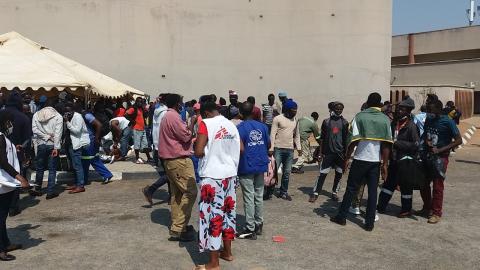Fadzai (Penny) Nyamande-Pangeti (IOM Zimbabwe Communications Specialist)
Background
COVID-19 has caused unprecedented economic and social disruption the world over and Zimbabwe is no exception. The International Organization for Migration (IOM) and partners have assisted the government through multi-sectoral initiatives with a focus on strengthening core capacities for public health measures at Points of Entry (PoEs).
Mental health and psychosocial support services (MHPSS) are a necessary part of this response as affected populations suffer the many negative impacts of the pandemic which include job losses, financial hardship, disturbances in education, the loss of loved ones, stigma, and isolation.
Migrants are among the most affected groups as governments introduce regulations such as lockdowns and border closures to contain the spread of the disease. MHPSS services are therefore aimed at promoting, protecting, and supporting the well-being of migrants, frontline staff, and host communities through activities to reduce psychosocial vulnerabilities and promote community resilience.
These activities are funded by The US State Department’s Bureau of Population, Refugees, and Migration (PRM). The Rapid Psychosocial Distress Screening tool is used to ascertain the stress levels of migrants at PoEs.
Overview
The dashboard provides an overview of the provision of Mental Health and Psychosocial Support Services at key Points of Entry (PoEs) in Zimbabwe between December 2020 and January 2021. Figures were drawn from some of Zimbabwe’s busiest border posts, Beitbridge, Chirundu, Forbes, Kazungula, and Plumtree.
As migrants made their way through border screening processes, 461 (61%M, 39%F) were offered counselling services after a Rapid Psychosocial Distress Screening tool was administrated. The average age of the returnees was 33.
Returning migrants present a range of concerns during counseling sessions, chief among them is uncertainty about the future as they return home after having been away for extended periods. Most are concerned about reintegrating into their communities with limited livelihood opportunities. Of those 461, only 59 referrals were made to other service providers such as the Department of Social Welfare to ensure the continuation of support for the most vulnerable.
Thousands of Migrants returned to Zimbabwe during the COVID-19 pandemic for various reasons, including arrest, deportation, and self-repatriation. Due to lack of proper social and economic structures and shortage of resources, the mass return of migrants is likely to be burdensome on local communities who are themselves drastically affected in social, economic, and public health terms as a result of the pandemic.
This backdrop can exacerbate returnees’ mental stress and further highlights the importance of strengthening social safety nets in receiving communities, providing post-arrival reintegration packages for returnees, and assisting with long-term skills development and livelihood opportunities for the returnees and their communities.






